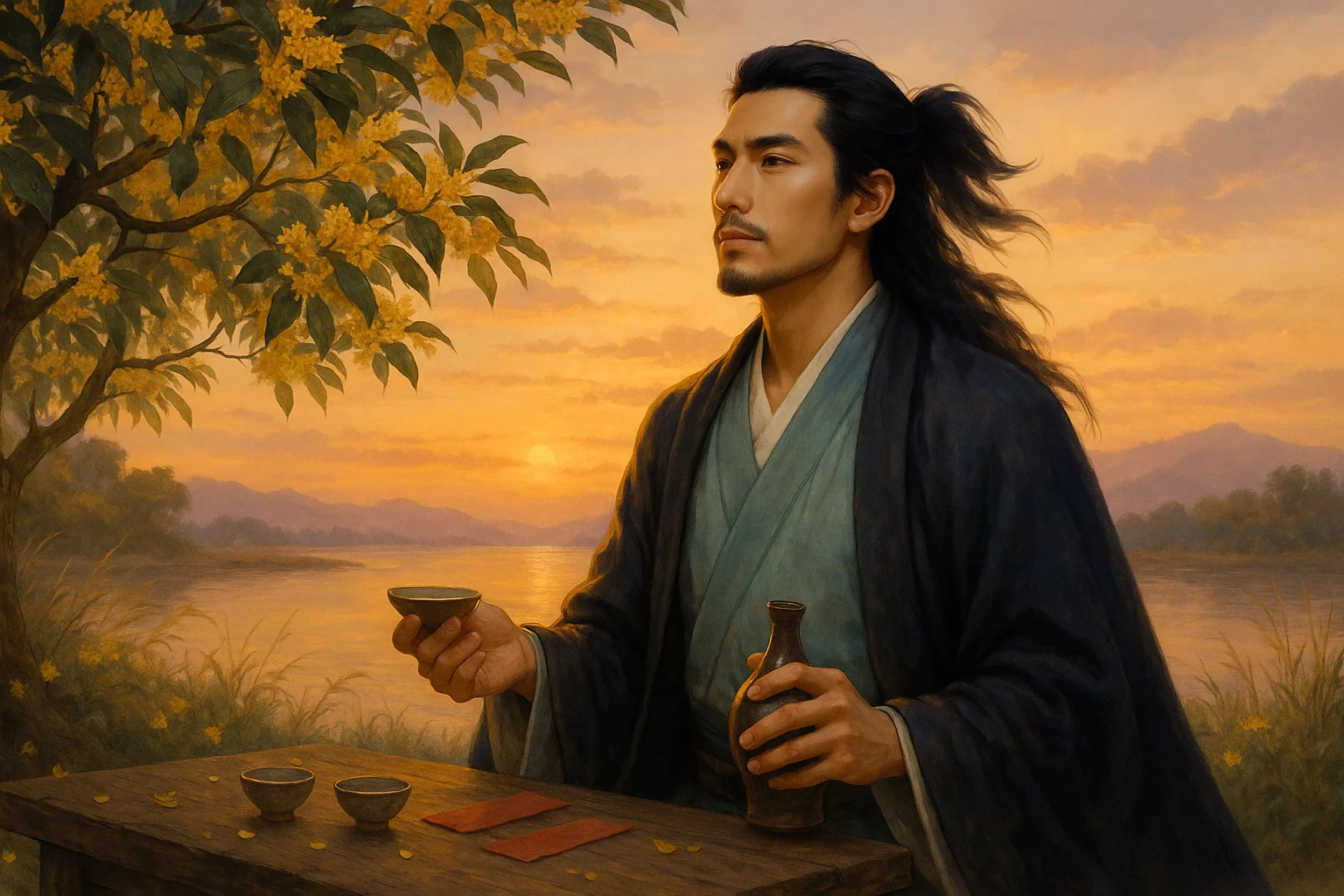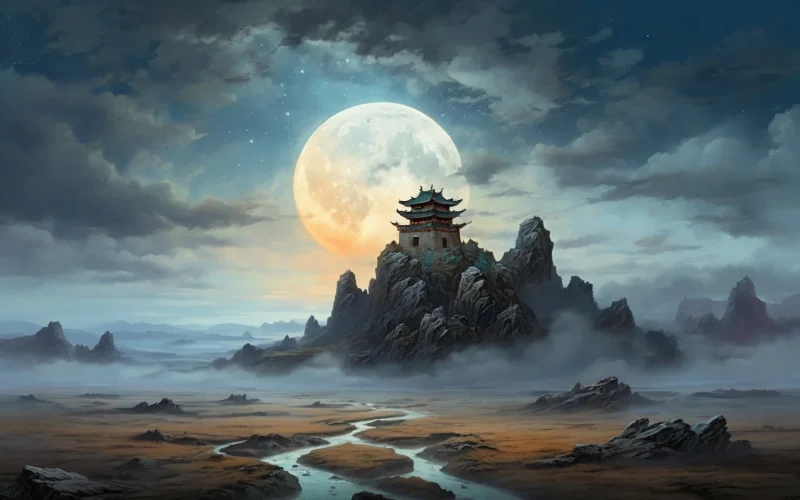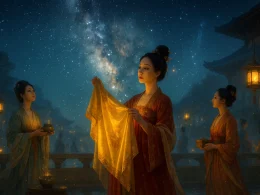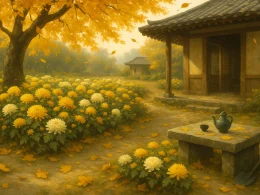Vast stretch the Central Plains, the road how long,
Our culture's crown now exiled to heaven's edge.
Only this lone minister sheds bloody tears,
No heroes left to knock at Heaven's gate.
Moonlit passes—frost and ice weigh heavy,
Palace winds—spring grasses grow wild.
Yet my lone loyalty still burns for my lord,
Like a sword's aura piercing night with light.
Original Poem
「夜思中原」
刘过
中原邈邈路何长,文物衣冠天一方。
独有孤臣挥血泪,更无奇杰叫天阊。
关河夜月冰霜重,宫殿春风草木荒。
犹耿孤忠思报主,插天剑气夜光芒。
Interpretation
Composed during the Southern Song Dynasty after the humiliating Longxing Peace Accord with the Jin Dynasty, this poem emerges from a fractured nation—the Central Plains lost, the Yangtze divided, and Hangzhou (then Lin'an) serving as a diminished capital. The poet, gazing north toward the fallen glory of Bianjing (modern Kaifeng), channels collective grief over territorial dismemberment and cultural rupture. Through geographic and meteorological metaphors, the work articulates a scholar-official's anguish over political impotence and undimmed loyalty, embodying the quintessential Southern Song literati consciousness of national humiliation and unextinguished patriotism.
First Couplet: "中原邈邈路何长,文物衣冠天一方。"
Zhōng yuán miǎo miǎo lù hé cháng, wén wù yì guān tiān yī fāng.
The Central Plains—
so distant the road stretches endless,
our ceremonial robes and rites
now exiled beyond heaven's edge.
The opening couplet spatializes cultural trauma. "The Central Plains" (中原), traditional heartland of Chinese civilization, becomes an inaccessible dream, its "endless road" (路何长) measuring both physical separation and psychological rupture. The "ceremonial robes and rites" (文物衣冠)—symbols of Han Chinese governance—are banished to "heaven's edge" (天一方), a cosmological displacement underscoring the Southern Song's diminished legitimacy. Zhou's genius lies in making geography itself weep for lost cultural continuity.
Second Couplet: "独有孤臣挥血泪,更无奇杰叫天阊。"
Dú yǒu gū chén huī xuè lèi, gèng wú qí jié jiào tiān chāng.
Only this solitary official
flings blood-streaked tears—
no extraordinary heroes left
to shout at palace gates.
Here the poet's body becomes a battlefield. "Blood-streaked tears" (血泪) merge physiological and emotional extremes, corporealizing patriotic grief. The "palace gates" (天阊), metonymy for imperial power, stand silent—their "no extraordinary heroes" (更无奇杰) lament indicts both the dearth of talent and the regime's failure to heed dissent. The couplet's visceral imagery (blood, shouting) contrasts with its political muteness, mirroring the scholar's fraught position: bodily present in the bureaucracy yet voiceless in policy.
Third Couplet: "关河夜月冰霜重,宫殿春风草木荒。"
Guān hé yè yuè bīng shuāng zhòng, gōng diàn chūn fēng cǎo mù huāng.
Frontier rivers under midnight moon
bear crushing frost—
while palace courtyards in spring winds
succumb to weeds.
Meteorological allegory dominates this couplet. The north's "crushing frost" (冰霜重) symbolizes Jin occupation's unrelenting harshness, while the south's "spring winds" (春风)—typically symbols of renewal—ironically nurture only ruins. The "weeded palaces" (草木荒) operate doubly: literally describing derelict northern palaces, metaphorically suggesting Southern Song governance's creeping decay. Zhou's mastery shines in pairing celestial constants (moon, wind) with human impermanence (frost, weeds), making nature itself testify to dynastic decline.
Fourth Couplet: "犹耿孤忠思报主,插天剑气夜光芒。"
Yóu gěng gū zhōng sī bào zhǔ, chā tiān jiàn qì yè guāng máng.
Still my lone loyalty burns
to serve my lord—
a sword's aura piercing heaven
blazes through night.
The finale transforms despair into transcendent resolve. "Lone loyalty" (孤忠) evokes Qu Yuan's archetypal exiled patriot, while the "sword's aura" (剑气) recalls the legendary Longyuan sword's indomitable spirit. This luminous weapon imagery achieves alchemy—personal fidelity becomes celestial phenomenon, the "night blaze" (夜光芒) defying both literal darkness and political gloom. The couplet's verticality ("piercing heaven") contrasts with the poem's earlier horizontal displacements, suggesting spiritual elevation above terrestrial fragmentation.
Holistic Appreciation
This poem exhibits grand conception and profound emotion, embodying the quintessential patriotic nostalgia of Southern Song literati who grieve the past while lamenting the present. The opening couplet employs "distant" (邈邈) and "endlessly long" (何长) to depict spatial remoteness—yet this geographical separation serves as a metaphor for political isolation, conveying boundless yearning for the Central Plains.
The second couplet turns inward, where the poet’s self-portrayal as a "solitary loyalist" (孤忠) devoid of "exceptional heroes" (无奇才) expresses both self-mocking vulnerability and a veiled critique of court corruption.
In the third couplet, the bitter cold of frontier passes and the desolate overgrowth of palace courtyards construct a panorama of desolation, mirroring the stark reality of national catastrophe and shattered homes.
The finale’s self-representation as a "sky-piercing sword’s aura" (插天剑气) reveals an unbroken spirit of loyalty despite obscurity, channeling fierce devotion to the nation and indomitable resolve.
Through concise language and profound imagery, the poem masterfully interweaves scene and sentiment. Its emotional spectrum spans impassioned fervor to solemn melancholy, laying bare the poet’s complex inner world and deep concern for the nation’s destiny.
Artistic Merits
- Emotion and Scenery Intertwined with Profound Symbolism
The poem employs spatial distance to convey political isolation and natural imagery to symbolize national decline, seamlessly blending emotion and imagery with rich symbolic meaning. - Subtle Allusions and Apt Self-Comparisons
By likening himself to a "solitary minister" and a "gleaming sword," the poet expresses both his noble isolation and unwavering loyalty, while also alluding to his personal struggles and aspirations. The allusions are employed naturally and fittingly. - Tight Structure with Progressive Layering
The poem moves from spatial expanse to personal reflection, then expands to frontier and palace scenes, before ultimately returning to individual resolve. The structure is both expansive and cohesive, with a smooth and compelling rhythm. - Concise Language and Compact Rhythm
The seven-character regulated verse adheres to strict formal constraints, with precise phrasing that balances the grandeur of Tang poetry and the introspective nuance of Song lyricism.
Insights
This poem embodies the sense of responsibility and patriotic sentiment of literati who cared deeply for their nation and its people, reminding later generations to remember history and cherish peace. At the same time, the poet’s plight—his unrecognized loyalty—serves as a warning: a society must embrace talent and empower exceptional individuals to achieve national prosperity.
The poem’s depiction of an "unyielding spirit, like a sword’s aura that never fades even when buried" inspires people to persevere through adversity, hold fast to their ideals, and strive relentlessly. This profound reflection on the conflict between ideals and reality, as well as the emotional expression in this work, remains a vital spiritual resource for literati facing hardship throughout the ages.
About the Poet

Liu Guo (刘过 1154 - 1206), a native of Taihe in Jiangxi, was a ci poet of the Bold and Unconstrained School (haofang pai) during the Southern Song Dynasty. Though he remained a commoner all his life, wandering the rivers and lakes, he associated with literary giants like Lu You and Xin Qiji. His ci poetry is impassioned and heroic, and his verse is vigorous and forceful. Stylistically close to Xin Qiji but even more unrestrained, Liu Guo became a central figure among Xin’s poetic followers.












